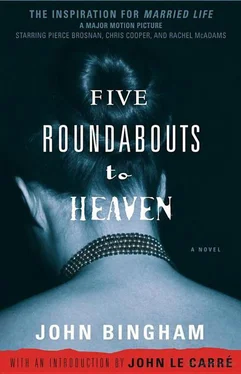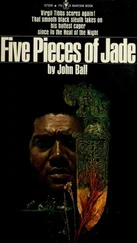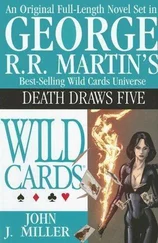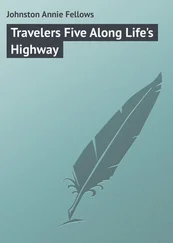John Bingham - Five Roundabouts to Heaven
Здесь есть возможность читать онлайн «John Bingham - Five Roundabouts to Heaven» весь текст электронной книги совершенно бесплатно (целиком полную версию без сокращений). В некоторых случаях можно слушать аудио, скачать через торрент в формате fb2 и присутствует краткое содержание. Жанр: Криминальный детектив, на английском языке. Описание произведения, (предисловие) а так же отзывы посетителей доступны на портале библиотеки ЛибКат.
- Название:Five Roundabouts to Heaven
- Автор:
- Жанр:
- Год:неизвестен
- ISBN:нет данных
- Рейтинг книги:4 / 5. Голосов: 1
-
Избранное:Добавить в избранное
- Отзывы:
-
Ваша оценка:
- 80
- 1
- 2
- 3
- 4
- 5
Five Roundabouts to Heaven: краткое содержание, описание и аннотация
Предлагаем к чтению аннотацию, описание, краткое содержание или предисловие (зависит от того, что написал сам автор книги «Five Roundabouts to Heaven»). Если вы не нашли необходимую информацию о книге — напишите в комментариях, мы постараемся отыскать её.
Five Roundabouts to Heaven — читать онлайн бесплатно полную книгу (весь текст) целиком
Ниже представлен текст книги, разбитый по страницам. Система сохранения места последней прочитанной страницы, позволяет с удобством читать онлайн бесплатно книгу «Five Roundabouts to Heaven», без необходимости каждый раз заново искать на чём Вы остановились. Поставьте закладку, и сможете в любой момент перейти на страницу, на которой закончили чтение.
Интервал:
Закладка:
“Breakfast? You’ll be lucky if you get a cup of tea and a slice of toast. Breakfast finishes at nine thirty.”
“Well, it’s only just nine thirty,” he replied wearily.
“It’s two minutes past.”
He looked at the clock. She followed his glance, and said: “That clock’s slow. Staff breakfast time is between nine thirty and ten; that’s the trouble, see? Besides, we don’t get paid between nine thirty and ten. I’m willing to serve the stuff, but the chef, he won’t have it, see? That’s the trouble.” She paused and smiled grimly. “When I first came here, I was ashamed to face the customers; now I’m as bad as the rest.”
Bartels said: “Bring me what you can, then. It can’t be helped.”
Surprisingly, having gained her point, she took his order without further fuss.
It was a shocking breakfast. He asked for tea and cereal, and he was brought coffee and porridge. This was followed by a piece of shrivelled smoked haddock. Instead of sugar for the porridge, there was watered-down syrup in a jug. Sugar for the coffee consisted of two tiny cubes, and there were two thin wafers of margarine for the toast.
In the middle of eating his porridge, Bartels heard a man shout plaintively across the dining room: “Can’t I ’ave my ’addock, Miss?”
Five years after the war, thought Bartels, and no breakfast after 9.30 except on sufferance. He picked disconsolately at his fish, and thought of his uncle James, in his loud check suits, his jaunty brown bowler hat and white socks.
Uncle James would have raised hell. He would have stormed and banged and called for the manager, and sent the coffee back, and had sugar for his porridge and butter, and lots of it, for his toast.
Finally, he would in all probability have got away from the hotel without paying his bill, and even, with the help of the genius of aunt Rose, have borrowed a fiver off the manager-to be paid back, tenfold, of course, when the great case was won.
But they were proper salesmen, and I am not, thought Bartels, I am just a bum commercial traveller who is now going to sneak out and buy some poison, if I’ve got the guts.
Bartels had no difficulty at all in buying a two-ounce bottle of altrapeine. The only mistake he made, and, as it turned out, it hardly mattered, was in trying to be a little too clever.
On the way out of the hotel he stopped by the letter-rack and examined some of the letters. What he wanted was a genuine name and address which was easy to remember. One of the letters was addressed to: A. Thompson, Esq., 99 Rugely Avenue, Bradford. He thought that would do very well. That would look as well as any other name in a poison book.
The chemist shop he decided to patronize was a large one in the middle of the city. He stood outside it a moment, watching the people enter and leave. Then he went in, and made his purchase.
He thought the assistant might ask him what he wanted such a dangerous drug for, but he didn’t. It was absurdly easy, thought Bartels, as he handed over the money, and took out his pen to sign the dangerous drugs book.
It was then that he made a slight slip, owing to the fact that, to make himself less easily recognizable should anything ever go wrong, he had removed his spectacles before entering the shop.
He tried to sign his name in the wrong column.
It gave him a bit of a shock, of course, because the assistant laughed as he corrected him and Bartels did not wish to attract attention, either by causing laughter or in any other way.
Later that day, he turned his car towards London. Once or twice he put his hand into his overcoat pocket to make sure the bottle was really there, that the whole thing was not a dream. His mind was not yet one hundred percent attuned to murder. But it was by the time he reached London.
Chapter 10
While Bartels was fumbling towards his crisis, I was making my own plans. I was crafty all right. I’ve already admitted as much. I wanted Lorna Dickson, and I made the necessary plans to get her. It is odd that I, Peter Harding, the cosmopolitan, the hotel proprietor, the cynic, had fallen for the woman at one meeting.
Yet that is one of the effects which Lorna Dickson had on people: either she made no impression at all, or else, once you had met her, you could think of little else.
I do not know why I fell in love with her. She was no longer a young girl. She had no classic beauty. She was not even unusually witty. So much my brain told me. My senses told me that she was the only woman I had ever met whom I seriously wished to marry. It was all illogical and even nonsensical, but it was a fact.
Lorna occupied my thoughts by day and by night, so that sometimes I hardly paid sufficient attention to the business at the office; instead, I would sit dreaming of her, of a future with her, or torturing myself with the thought that I might lose her to Bartels. The latter, however, was a mere masochistic game; given time, I knew I could beat Bartels.
But first I had to persuade myself that though it might cost me the friendship of Bartels, I had right, of a sort, on my side. For that is the hypocritical way some are made, and I am one of them.
Since I was determined to be so convinced, it was easy. It was merely a question of selecting the most telling argument. I pointed out to myself that I was unmarried, and Bartels was married, and married, too, to a jolly good wife, in whom any ordinary man would rejoice. Further, Beatrice did not deserve a blow of this kind.
I dismissed all Bartels’ own arguments as specious and finicky. I was pretty well off, too, one way and another, whereas Bartels, to put it frankly, was a bit of a failure. He was unlikely ever to have enough money to pay his wife an allowance and to keep Lorna in any real comfort. In fact, Lorna would probably have to continue with her dressmaking if they were going to do anything more than barely make ends meet. It was an iron-clad alibi for an act of treachery to a friend.
I always remember how innocently I wheedled her exact address and telephone number out of Bartels. It was the day the three of us had lunch together, and afterwards, when Lorna had gone, I said to him, quite casually:
“Whereabouts does she live, Barty?”
“Outside Woking,” he replied. “Near a village called Thatchley. She’s got a small, Georgian-style house. Runs a small car, and has quite a nice little business in the neighbourhood.”
“Thatchley,” I said thoughtfully, as though I had heard the name somewhere before. “Thatchley. Yes, I remember now, I’ve seen signposts pointing to it on the road to our hotel near Guildford.”
His face lit up, as though the mere fact that I had seen a signpost pointing to her village was a source of pleasure to him. Poor, foolish old Bartels. It was all so damned easy.
“Yes, I know now,” I said lightly. “Yes, of course-Thatchley, near Woking.”
I remember we had fetched our hats and coats, and were standing in the vestibule before parting. He said:
“If you pass that way during a weekend, pop in and see her. She gets a bit lonely during the weekends. It’s not so bad during the week, because she is often seeing people.”
Easy, dead easy, it was.
“She won’t want to see me ,” I said deprecatingly, for I intended to cover my tracks.
Bartels took the bait with one gulp. “She will,” he said eagerly. “I assure you, she’d love to see you.”
“Oh, I don’t think so,” I replied. “Not me. I don’t think she wants to see me.”
He was like the lemmings of Norway, which rush down to the coast and swim out to sea and drown. He just plunged on to his fate, because he thought he could trust me and because he knew that Lorna was lonely at weekends.
Читать дальшеИнтервал:
Закладка:
Похожие книги на «Five Roundabouts to Heaven»
Представляем Вашему вниманию похожие книги на «Five Roundabouts to Heaven» списком для выбора. Мы отобрали схожую по названию и смыслу литературу в надежде предоставить читателям больше вариантов отыскать новые, интересные, ещё непрочитанные произведения.
Обсуждение, отзывы о книге «Five Roundabouts to Heaven» и просто собственные мнения читателей. Оставьте ваши комментарии, напишите, что Вы думаете о произведении, его смысле или главных героях. Укажите что конкретно понравилось, а что нет, и почему Вы так считаете.












